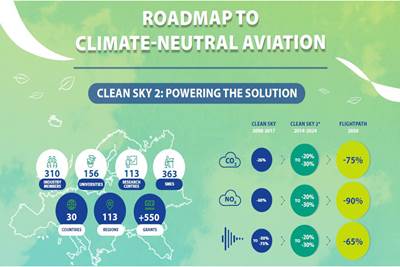Additional funding secures ZeroAvia hydrogen-electric engine development
Additional raise of $24.3 million in funding to accelerate developments for 50-plus seat aircraft and support commercial airline initiatives to adopt hydrogen.

Propelling its mission towards delivering airlines zero-carbon, hydrogen-fueled flight, (Hollister, Calif., U.S.) has announced that it is launching the development program for a two-megawatt (MW) hydrogen-electric powertrain for full-size regional aircraft. The program kick-off is supported by a new raise of $24.3 million, led by Horizons Ventures, joined by a new investor British Airways. Existing investors Breakthrough Energy Ventures, Ecosystem Integrity Fund, Summa Equity, Shell Ventures, and SYSTEMIQ also participated in the financing. This new round accelerates the larger hydrogen-electric engine development for the 50-plus seat aircraft and supports additional commercial airlines’ initiatives to adopt hydrogen in aviation (CW covers the growth of hydrogen storage and transport in its recent hydrogen collection). This announcement brings the company's total private investment to more than $53 million and the total funding raised since inception to nearly $74 million.
This latest funding follows the announcement in December that the UK Government — through the Department for Business Energy & Industrial Strategy (BEIS), the Aerospace Technology Institute (ATI) and Innovate UK — had awarded a £12.3 million grant ($16.3 million) to deliver a breakthrough 19-seat hydrogen-electric powered aircraft that is market-ready by 2023. The company announced its $21.4 million Series A funding round at the same time, accelerating its 600-kilowatt development program scheduled for commercial entry in 2024.
“This new funding, in conjunction with our other recent milestones, will significantly accelerate our path to zero-emission solutions for larger regional aircraft at a commercial scale,” says Val Miftakhov, CEO and founder of ZeroAvia. “With many airlines lining up and ready to make the shift to zero-emissions, we expect to see wide-scale adoption of this technology. We are extremely grateful for our investors who are helping to speed up our progress and ultimately the aviation industry's adoption of zero-emission flight.”
ZeroAvia expects to achieve commercialization for its hydrogen-electric powertrain as early as 2024. Its hydrogen aviation solutions will address various markets by initially targeting a 500-mile range in 10-20 seat aircraft used for commercial passenger transport, package delivery, agriculture and beyond. Accelerated by this new capital infusion, ZeroAvia will also target entering the 50-plus seat commercial aircraft segment by 2026.
“Flying on jet fuel comes with an environmental cost, and finding an alternative for the aviation industry is vital. We believe ZeroAvia offers a real and practical solution for the aviation market to move towards cleaner options,” adds Patrick Poon from Horizons Ventures.
The round will also further derisk the company vision of powering a 100-seat single-aisle aircraft by 2030. ZeroAvia's achievements to date are said to be the first steps in realizing the near-term transition from fossil fuels to zero-emission hydrogen as the primary source for commercial aviation.
As the company continues to scale its global operations, ZeroAvia also brings three new members to the senior team:
Christine Ourmières-Widener joins ZeroAvia's Board of Directors and brings executive experience cultivated from her time spent in top leadership at airline and travel corporations, including VP and GM USA for Air France-KLM (Tremblay-en-France, France), CEO and board member of CityJet (Swords, Ireland), chief global sales officer of American Express Global Business Travel and CEO of FlyBe (Exeter, U.K.). She previously served on the Board of Governors for the International Air Transport Association (IATA, Montreal, Canada) and was a non-executive director for the airline retailer Datalex (Dublin, Ireland).
Mike Friend, a retired Boeing (Chicago, Ill., U.S.) senior technology director and consultant for Mitsubishi Aircraft (Moses Lake, Wash., U.S. and Aichi, Japan), joins the Technical Advisory Board to lend his extensive aerospace technology knowledge to the powertrain development programs. In the early 2000s, he led a historic Boeing Phantom Works project in Spain, resulting in the world's first manned hydrogen-electric airplane flight. Following that, he was a chief engineer in the New Airplane Product Development team at Boeing Commercial Aircraft, playing critical roles in developing multiple vehicle concepts, including Boeing 787 Dreamliner.
Mark Blair, a retired FedEx VP of Air Operations and a former director of Fleet and Government Sales for Cessna Aircraft Co. (Wichita, Kan., U.S.) joins ZeroAvia Advisory Board to lend his extensive knowledge in package delivery applications of various sizes of aircraft. Mark is also engaged with a number of cargo and passenger operators in advisory capacities and will bring this diverse operator perspective to ZeroAvia.
Related Content
Plant tour: Aernnova Composites, Toledo and Illescas, Spain
RTM and ATL/AFP high-rate production sites feature this composites and engineering leader’s continued push for excellence and innovation for future airframes.
Read More“Structured air” TPS safeguards composite structures
Powered by an 85% air/15% pure polyimide aerogel, Blueshift’s novel material system protects structures during transient thermal events from -200°C to beyond 2400°C for rockets, battery boxes and more.
Read MoreLow-cost, efficient CFRP anisogrid lattice structures
CIRA uses patented parallel winding, dry fiber, silicone tooling and resin infusion to cut labor for lightweight, heavily loaded space applications.
Read MoreThe next-generation single-aisle: Implications for the composites industry
While the world continues to wait for new single-aisle program announcements from Airbus and Boeing, it’s clear composites will play a role in their fabrication. But in what ways, and what capacity?
Read MoreRead Next
Clean Sky 2 study emphasizes need for hydrogen-powered aviation development
Independent study found hydrogen as primary energy source for aircraft propulsion, outlines roadmap and required policy actions for hydrogen aviation, fuel cell technology development.
Read MoreNext-gen fan blades: Hybrid twin RTM, printed sensors, laser shock disassembly
MORPHO project demonstrates blade with 20% faster RTM cure cycle, uses AI-based monitoring for improved maintenance/life cycle management and proves laser shock disassembly for recycling.
Read MoreScaling up, optimizing the flax fiber composite camper
Greenlander’s Sherpa RV cab, which is largely constructed from flax fiber/bio-epoxy sandwich panels, nears commercial production readiness and next-generation scale-up.
Read More












